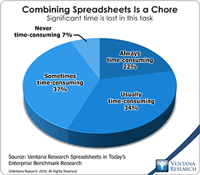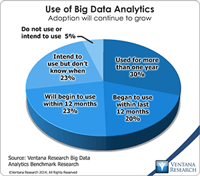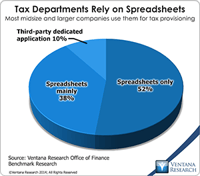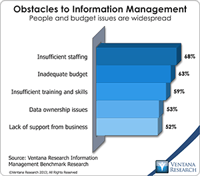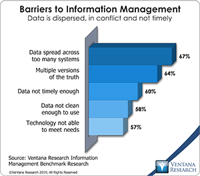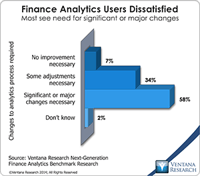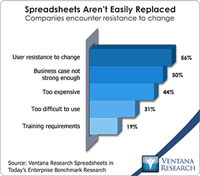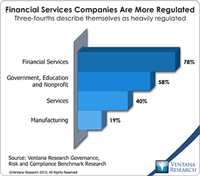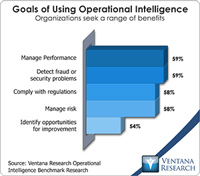Ventana Research coined the term “enterprise spreadsheet” in 2004 to describe a variety of software applications that add a desktop spreadsheet’s user interface (usually that of Microsoft Excel) to components that address the issues that arise when desktop spreadsheets are used in repetitive, collaborative enterprise processes. Enterprise spreadsheets are designed to provide the best of both worlds in that they offer the ease of use and flexibility of desktop spreadsheets while overcoming their...
Read More
Topics:
Operational Performance Management (OPM),
Analytics,
Business Analytics,
Business Intelligence,
Uncategorized,
Business Performance Management (BPM),
Customer Performance Management (CPM),
Financial Performance Management (FPM),
Information Management (IM),
Sales Performance Management (SPM),
Supply Chain Performance Management (SCPM)
Optimization is the application of algorithms to sets of data to guide executives and managers in making the best decisions. It’s a trending topic because using optimization technologies and techniques to better manage a variety of day-to-day business issues is becoming easier. I expect optimization, once the preserve of data scientists and operations research specialists will become mainstream in general purpose business analytics over the next five years.
Read More
Topics:
Big Data,
Performance Management,
Social Media,
Operational Performance Management (OPM),
Analytics,
Business Analytics,
Business Collaboration,
Business Performance Management (BPM),
Customer Performance Management (CPM),
Financial Performance Management (FPM),
Information Management (IM),
Sales Performance Management (SPM),
Supply Chain Performance Management (SCPM),
Price Optimization
One of the issues in handling the tax function in business, especially where it involves direct (income) taxes, is the technical expertise required. At the more senior levels, practitioners must be knowledgeable about accounting and tax law. In multinational corporations, understanding differences between accounting and legal structures in various localities and their effects on tax liabilities requires more knowledge. Yet when I began to study the structures of corporate tax departments, I was...
Read More
Topics:
Big Data,
ERP,
GRC,
Office of Finance,
audit,
finance transformation,
LongView,
Tax,
Analytics,
Business Analytics,
Governance, Risk & Compliance (GRC),
Oracle,
Business Performance Management (BPM),
CFO,
Financial Performance Management (FPM),
Information Management (IM),
Vertex,
FPM,
Innovation Awards,
Thomson-Reuters multinational
One of the issues in handling the tax function in business, especially where it involves direct (income) taxes, is the technical expertise required. At the more senior levels, practitioners must be knowledgeable about accounting and tax law. In multinational corporations, understanding differences between accounting and legal structures in various localities and their effects on tax liabilities requires more knowledge. Yet when I began to study the structures of corporate tax departments, I was...
Read More
Topics:
Big Data,
ERP,
GRC,
Office of Finance,
audit,
finance transformation,
LongView,
Tax,
Analytics,
Business Analytics,
Governance, Risk & Compliance (GRC),
Oracle,
Business Performance Management (BPM),
CFO,
Financial Performance Management (FPM),
Information Management (IM),
Vertex,
FPM,
Innovation Awards,
Thomson-Reuters multinational
When applying information technology to drive better business performance, companies and the systems integrators that assist them often underestimate the importance of organizing data management around processes. For example, companies that do not execute their quote-to-cash cycle as an end-to-end process often experience a related set of issues in their sales, marketing, operations, accounting and finance functions that stem from entering the same data into multiple systems. The inability to...
Read More
Topics:
Big Data,
Mobile,
ERP,
Office of Finance,
Operational Performance Management (OPM),
Operations,
Management,
close,
closing,
computing,
end-to-end,
Analytics,
Cloud Computing,
Data Management,
Business Performance Management (BPM),
CRM,
Data,
finance,
Information Applications (IA),
Information Management (IM),
Sales Performance Management (SPM),
Supply Chain Performance Management (SCPM),
FPM
From my perspective, Infor’s strategy to accelerate revenue growth is to offer companies more innovation and a lower and more predictable cost of ownership than its rivals in the business software market; its products include the major categories of ERP, human resources and financial performance management. It aims to innovate by focusing on improving the user experience and to lower costs by redesigning its software architecture. The innovation stems from a fresh approach to designing...
Read More
Topics:
Microsoft,
Mobile,
SaaS,
Sales,
Customer Experience,
ERP,
HCM,
Human Capital,
Office of Finance,
Operational Performance Management (OPM),
Dynamics AX,
Dynamics GP,
Dynamics NAV Dynamics SL,
Sage Software,
UI,
Unit4,
Analytics,
Business Analytics,
Business Collaboration,
Cloud Computing,
Business Performance Management (BPM),
CFO,
Customer Performance Management (CPM),
Financial Performance Management (FPM),
FinancialForce,
HR,
Infor,
Information Management (IM),
Sales Performance Management (SPM),
Supply Chain Performance Management (SCPM),
Workday,
Workforce Performance Management (WPM),
Financial Performance Management,
FPM,
Plex
Business computing has undergone a quiet revolution over the past two decades. As a result of having added, one-by-one, applications that automate all sorts of business processes, organizations now collect data from a wider and deeper array of sources than ever before. Advances in the tools for analyzing and reporting the data from such systems have made it possible to assess financial performance, process quality, operational status, risk and even governance and compliance in every aspect of a...
Read More
Topics:
Big Data,
Planning,
Predictive Analytics,
Governance,
Office of Finance,
Budgeting,
close,
Finance Analytics,
Tax,
Analytics,
Business Analytics,
Business Intelligence,
CIO,
Governance, Risk & Compliance (GRC),
In-memory,
Business Performance Management (BPM),
CFO,
Financial Performance Management (FPM),
Information Management (IM),
Risk,
CEO,
Financial Performance Management,
FPM
Our benchmark research on enterprise spreadsheets explores the pitfalls that await companies that use desktop spreadsheets such as Microsoft Excel in repetitive, collaborative enterprise-wide processes. Because people are so familiar with Excel and therefore are able to quickly transform their finance or business expertise into a workable spreadsheet for modeling, analysis and reporting, desktop spreadsheets became the default choice. Individuals and organizations resist giving up their...
Read More
Topics:
GRC,
Office of Finance,
Operational Performance Management (OPM),
Reporting,
enterprise spreadsheet,
Analytics,
Business Analytics,
Business Collaboration,
Cloud Computing,
Governance, Risk & Compliance (GRC),
Business Performance Management (BPM),
Customer Performance Management (CPM),
Financial Performance Management (FPM),
Information Applications (IA),
Information Management (IM),
Risk,
Sales Performance Management (SPM),
Supply Chain Performance Management (SCPM),
Workforce Performance Management (WPM),
benchmark,
Financial Performance Management
Integrated risk management (IRM) was a major theme at IBM’s recent Smarter Risk Management analyst summit in London. In the market context, IBM sees this topic as a means to differentiate its product and messaging from those of its competitors. IRM includes cloud-based offerings in operational risk analytics, IT risk analytics and financial crimes management designed for financial institutions and draws on component elements of software that IBM acquired over the past five years, notably from ...
Read More
Topics:
GRC,
Office of Finance,
Operational Performance Management (OPM),
Chief Risk Officer,
CRO,
ERM,
OpenPages,
Business Analytics,
Business Collaboration,
Cloud Computing,
Data Governance,
Governance, Risk & Compliance (GRC),
IBM,
Business Performance Management (BPM),
compliance,
Customer Performance Management (CPM),
Data,
Information Applications (IA),
Information Management (IM),
IT Performance Management (ITPM),
Risk,
Supply Chain Performance Management (SCPM),
Financial Services,
FPM
All the hubbub around big data and analytics has many senior finance executives wondering what the big deal is and what they should do about it. It can be especially confusing because much of what’s covered and discussed on this topic is geared toward technologists and others working outside of Finance, in areas such as sales, marketing and risk management. But finance executives need to position their organization to harness this technology to support the strategic goals of their company. To...
Read More
Topics:
Big Data,
Performance Management,
Predictive Analytics,
Customer Experience,
Fraud,
Governance,
GRC,
Office of Finance,
audit,
Controller,
Analytics,
Business Analytics,
Cloud Computing,
Governance, Risk & Compliance (GRC),
Operational Intelligence,
Business Performance Management (BPM),
CFO,
compliance,
finance,
Financial Performance Management (FPM),
Information Management (IM),
Risk,
Financial Performance Management,
financial risk management
